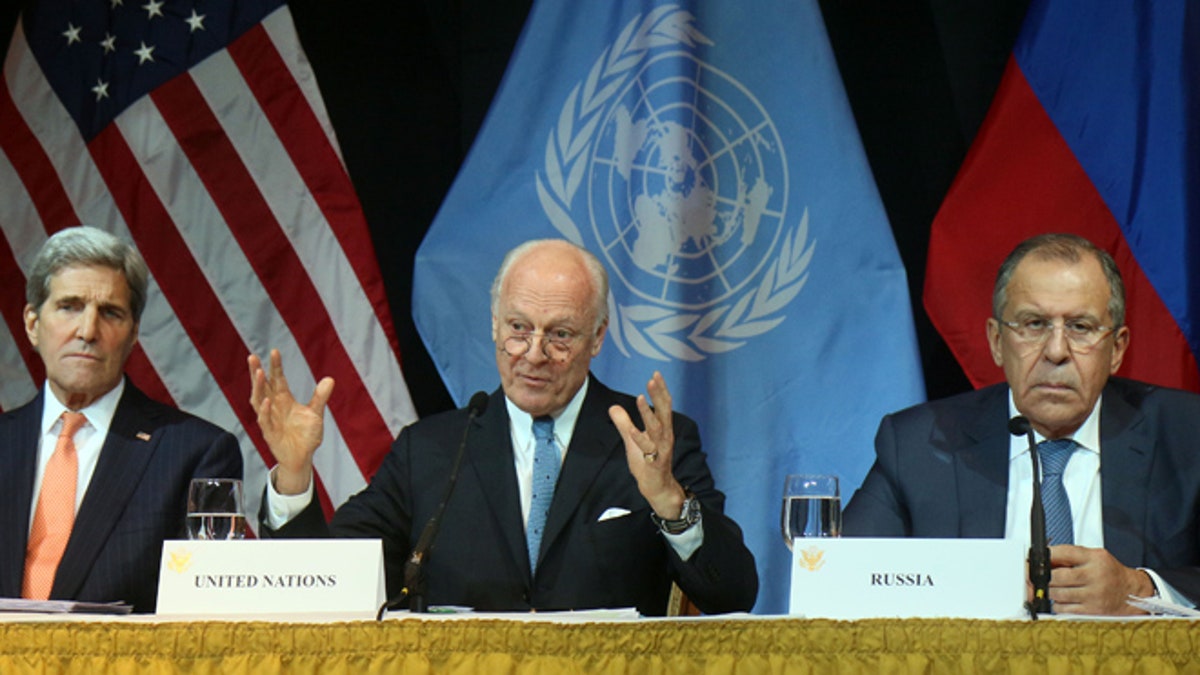
Nov. 14, 2015: Secretary of State John Kerry, UN Special Envoy for Syria Staffan de Mistura and Russian Foreign Minister Sergey Lavrov, in Vienna. (AP)
Secretary of State John Kerry said Saturday that world leaders have made progress toward ending the civil war in Syria, where the chaos has allowed the Islamic State, the terror group responsible for the Paris terror attacks, to flourish.
Kerry and the other world leaders in Vienna agreed on a timeline for a political transition in Syria that is aimed at ending the country's civil war. However, key details, including the status of Syrian President Bashar Assad and a determination of which opposition groups are terrorists, remain unresolved.
“We do not agree on all of the issues,” Kerry said. “But we do agree on this: It’s time for the bleeding to stop. … It’s time not to allow terrorists a single kilometer.”
The United States has tried for years to end the Assad regime, which has been accused of using chemical weapons on civilians and other crimes against humanity, while Russia has support Assad. Moscow in recent weeks has openly launched air strikes against government-opposition forces in Syria.
Kerry announced agreement on a Jan. 1 date for the start of talks between Assad's government and the opposition. The U.N. special envoy for Syria, Staffan de Mistura, is to begin immediate work on determining who should sit at the table.
Within six months, the negotiations between the Syrian sides are to establish "credible, inclusive and nonsectarian" transitional government that would set a schedule for drafting a new constitution, according to a joint statement released by the United Nations on behalf of the 19 parties to the talks.
A free and fair U.N.-supervised election would then be held within 18 months, according to the statement.
The diplomats agreed on a means to enforce a cease-fire but failed to agree on which groups other than the Islamic State and al Qaeda affiliates would not be eligible for the truce. Under those terms, the sponsors of each group covered by the cease-fire would be responsible for making sure that group upholds it.
Russian Foreign Minister Sergey Lavrov said Jordan would oversee a process that would identify which groups should be considered for identification as terrorists. That process is to be completed by the time the political process between the government and opposition begins in January.
Kerry acknowledged that participants also failed to agree on Assad's role in the transition or his potential future role in the country's government. The United States and its allies have said the war cannot end while Assad is in power but Russia and Iran have insisted that Syrians must decide their own leadership.
The participants also agreed to meet before the end of the year in Paris to go over progress made toward the cease-fire and the selection of delegations for the political talks.
Saturday's meeting was overshadowed by the terrorist shootings and bombings in Paris that killed more than 120 people, and Syria as a breeding ground for terrorism moved to the foreground of the talks as participants linked the shooting and bombing attacks in Paris to Mideast turmoil and the opportunities it gives for terror.
Kerry and Lavrov both condemned the attacks as they began meetings with senior representatives from Iran, Saudi Arabia and other countries with strongly conflicting views on how to end the more than four-year war.
Secretary-General Ban Ki-moon urged ministers "to move beyond their differences on Syria" and work on a negotiated end to the war.
More than 250,000 people have been killed in the Syrian war. Eleven million have been uprooted from their homes. The conflict has allowed Islamic State militants to carve out significant parts of Syria and Iraq for their would-be caliphate. Europe and Syria's neighbors, meanwhile, are struggling to cope with the worst migrant crisis since World War II.
The Associated Press contributed to this report.




